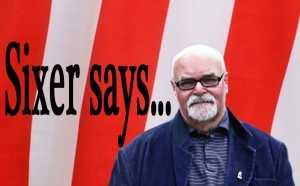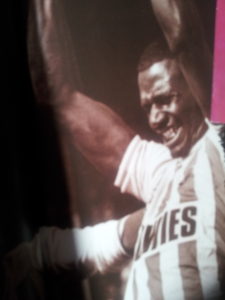
On days such as this, it would be wrong for Salut! Sunderland to detach itself from events in a cruel world away from football. Our sympathies and solidarity go out to all those affected or bereaved by the tragic fire in a tower block in north Kensington, London overnight
Pete Sixsmith is in the midst of a truly engaging series on all the Sunderland relegations – which means all but one – he has known. He even managed to write about the one, our first from the top flight, that occurred before he was supporting SAFC.
The series can be seen in its entirety at https://safc.blog/category/pete-sixsmith/sunderlands-10-relegations/.
Here is the fifth instalment, For those of a squeamish disposition, prepare to have to put up with a lot of Lawrie McMenemy and a very angry, all these years on, Sixer. As we’ve come to expect from the lad – much slimmed down these days thanks to a paper round and healthy eating – it’s a great read combining vast footballing knowledge, a grasp of historical detail and the fallout of a lifetime spent following Sunderland through thick, thin and thinner …
And so it came to pass that, with the departure of one half of the Flowerpot Men, we appointed a Woodentop as manager who assembled a couple of Rag, Tag and Bobtail teams that saw us drop into the third tier of English professional football for the first and so far only time in our 127-year Football League/ Premier League history.
Lawrie McMenemy had done an excellent job at Southampton, establishing them in the top flight, winning the FA Cup in 1976 and carving out a career for himself as a down to earth Geordie pundit on the BBC.
He seemed a perfect fit for a club that needed a lift after relegation and he was met by hundreds of fans outside Roker Park when he arrived to take over. Whether those same fans were throwing stones at him as he left 20 months later is a matter of conjecture.
He brought in some useful players too, with Eric Gates, Alan Kennedy, George Burley and Frankie Gray arriving so promotion was seen as a mere formality, followed by a challenge at the top of Division One and regular European football under the avuncular Gateshead man.
It didn’t work out quite like that. His first season saw us seriously dabble with relegation and Second Division security was established only in the penultimate game as Shrewsbury Town were dispatched at Roker thanks to goals from Gates and Proctor.
Surely the next season would be better, we thought but little did we know that it wouldn’t. Things could not get better……
Chairman Tom Cowie, who had removed his company logo from the front of the clubs shirt, (Vaux were the new shirt sponsor – better than Phillipine based betting companies and South African catering companies), and appeared reluctant to put a great deal of money into the club leaving McMenemy and his assistant Lew Chatterley, to look around for bargains.
We started the season with a new goalkeeper in Iain Hesford, acquired from Sheffield Wednesday and one of three sport-playing brothers. Brother Steve played Rugby League for Warrington and England while Brother Bob played the other code and also had England caps.
The other close season arrival was David Buchanan from, er, Blyth Spartans. He had started at Leicester City and made his debut on the same day as a certain Gary Lineker (they shared a bag of crisps after the game) but his career had stalled so while Lineker was at Nou Camp, Buchanan was lording it at places like Croft Park, Dean Street and Kingsway.
Both played in an encouraging opening day win at Huddersfield thanks to goals from Frankie Gray and Big Dave Swindlehurst. It was followed by an appalling home League Cup defeat to York City (managed by Dennis Smith) and then there was a disappointing home draw with Brighton. Although we won the second leg at Bootham Crescent, we went out on away goals, leaving us to concentrate on the league.

Alas we didn’t. The third league game of the season was a dreadful 6-1 defeat at Blackburn which saw us play with three central defenders (Gary Bennett, David Corner and Reuben Agboola) and three forwards (Davids Swindlehurst and Buchanan and Eric Gates). It was a performance that prompted me to approach Lew Chatterley and the coaching staff and vent my considerable spleen about the absolute shambles they presided over.
It improved slightly and at one stage we reached the heady heights of fifth as Buchanan rode again and started scoring goals. But a 2-1 defeat at Bramall Lane (looking forward to going there next season; a ground I like) saw us take two wins out of the next 12 and the slide was well and truly on.
Terry Curran had come and gone by the time we lost at Boothferry Park. He had been a star at Sheffield Wednesday, a bit part player at Everton and a complete waste of time at Sunderland.
If any player summed up the McMenemy period it was him. Full of his own self-importance, convinced that he was brilliant and dismissive of those around him, he was not the most popular player in the dressing room nor on the rapidly emptying Roker Park terraces.
This was a poor time for football. Bradford and Heysel had happened and Hillsborough was about to. Crowds were down, with our average at around 13,000, with league champions Manchester United getting 40,000, Liverpool 36,000 and Our Friends from the North, 24,000.
It was not a fashionable time to be a football fan as hooliganism, poor stadiums and a tendency for clubs to take the support for granted made one wonder whether football was in terminal decline.
It was for Lawrie. The slide became a veritable Cresta Run to the Third Division and by the time he went in March after a wretched 2-1 home defeat to Sheffield United (managed by Ian Porterfield), we were in the bottom six.
Tom Cowie had also left and the new chairman was Bob Murray, a lifelong fan from Consett whose first act was to sack McMenemy and his staff, which included his son Chris who, according to his father, was a wonderful coach.
Murray dragged Bob Stokoe out of retirement to try to save the club, but the players were shot and home defeats to Bradford City and Barnsley did for us.
In those days, the team finishing 20th played the fifth placed team from the league below. So, off we went to the Priestfield Stadium in Gillingham for a game with a club who had never been out of the bottom two divisions against a team who had never been in them. The first leg was lost 2-3 with Mark Proctor scoring both. I remember driving round south Durham delivering union material for a strike and listening to John Cairns on BBC Newcastle as he described the game in his own inimitable way and bemoaning the fact that we looked doomed.
I missed the second leg at Roker as I had promised to take my parents to East Midlands Airport that day. I could have changed it but didn’t and as I drove the Austin Mini Metro southwards, the scores kept coming through on the sports programme on Radio 2. No mobiles, texts or 5Live in those dim and distant days.
The crowd was 25,000, the players did their best but ultimately it wasn’t enough. Pritchard and Cascarino netted for the Kent team and Gary Bennett was a giant in the Sunderland team that day, a performance which stamped him as a club legend. He scored in the 90th minute to take it to make it 3-2 on the day and take it to extra time.
We needed to score one and not concede, but the Irishman with the Italian name and the Sarf London accent made it 3-3 on the day, but it put Gillingham 6-5 up on aggregate.
Keith Bertschin’s late winner was to no avail and the crowd trooped out cursing McMenemy and regretting Mark Proctor’s penalty miss which, had he scored, would have put us 3-1 up on the day and ahead on aggregate. That he had missed a penner against Barnsley in the final league game which may have led to us going on to win that game and staying up made it all the worse.
It was an utterly wretched season with poor football, a manager who refused to face up to reality, constant sniping at the club by wannabee owner Barry Batey and supporters who had lost faith and belief in the direction that the club was taking. Anything sound familiar?
It did give us a chance to clear out the deadwood, with the likes of Hetzke, Swindlehurst and Kennedy leaving and a new manager in Dennis Smith coming in. He took us straight back up after trips to places we thought we would never play at such as Chester, Aldershot and Springfield Park, Wigan, home of the Latics Mud Slide.
Away from football, we saw the introduction of GCSEs to replace O Levels and CSEs, and the arrival of The Independent newspaper, with its strapline “We are. Are You?”
On the banks of the coaly Tyne, plain John Hall, as he was then, opened the behemoth known as the Metro Centre, although some thought that the coke works it replaced were more aesthetic, and Durham Castle and Cathedral became a UNESCO World Heritage Site.
Prime Minister Margaret Thatcher (a Tory who knew when to call an election) opened the completed M25, thereby creating Europe’s biggest car park, while one of her predecessors, Harold Macmillan died after warning Maggie that it was not a good idea to sell off the family silver. As usual, she ignored any advice.
Terry Waite was kidnapped by Islamic Jihad in Lebanon which spared him seeing our relegation.
When he re-emerged from captivity, we were in the First Division, so he missed quite a bit. One great Scot arrived as Andy Murray was born and another left us as the great Fulton Mackay passed on. One of the pleasures of television in the 70s was watching his battles with Norman Stanley Fletcher and his bullying of poor Mr Barrowclough in Porridge. And he almost upstaged Burt Lancaster in Local Hero so that’s not a bad cv for a Paisley-born lad.
When the season opened, The Lady In Red by Chris de Burgh topped the charts and when it ended Starship were there with Nothing’s Gonna Stop Us Now a ditty which many football fans (but not Lawrie McMenemy) readily identified with.
On TV home-grown programmes included The Singing Detective (“Am I right or am I right”) with Joanne Whalley smearing cream all over Michael Gambon – “it’s a tough job but someone’s gotta do it” said The Great Gambo – while Oliver Reed stumbled around the set as inebriated as a dipsomaniac newt, on Aspel and Company.
Not content with producing rubbish soaps of our own (Albion Market anyone), we bought in Neighbours to fill in the afternoons and Prisoner Cell Block to pad out the late nights. Flimsy scenery, awful acting and weak plots made them staples of UK viewing in the decade that all Sunderland supporters want to forget.
And in the meantime, we wait for a manager……… expect McInnes-linked developments very soon.
